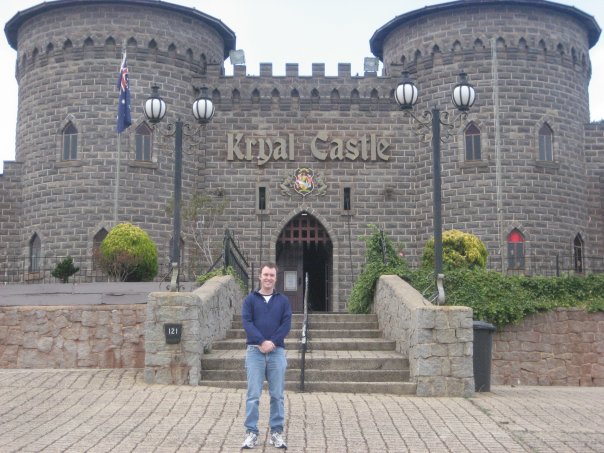Speech pathology homework doesn’t have to be boring
Atop a foothill of Mt Warrenheip, a mere 8km from my childhood home in Ballarat, sits Kryal Castle. Behold its magnificence!
Built in the 1970s by one Keith Ryall, the castle features a moat, a maze, stocks, an armory, mock-hangings, performing lions, jousting knights, juggling jesters and – best of all for ten year old me – a gruesome Wax Torture museum. Of all the many, kitschy and odd tourist attractions in Australia, Kryal Castle is by far the best and – outside of Ballarat and her surrounds – one of the least well-known.
I still remember the Winter’s day when Dad took us out to the Castle. In hindsight, the trip was designed to give Mum a day off. But what I remember most is how I lost my voice from talking (and shouting) so much – describing all I could see from the parapet, re-telling the jesters’ jokes, giving detailed instructions to my sister about where the bathroom was (sending her, screaming, via the Wax museum), plotting my course through the maze with a map, and negotiating with Dad about the purchase of bag upon bag of hot chips. In short, it was the perfect language work out!
When I think about young kids (and their parents) trudging guiltily to speech pathology sessions carting tatty scrapbooks stuffed with half-completed worksheets, I sometimes wonder why we make it so hard – and boring. Don’t get me wrong, there’s a time and a place for worksheets. Some children and families love them. They can be an efficient way of getting in lots of repetitions in a short time.
But the purpose of speech pathology is not to kill trees or to line the pockets of worksheet presses. It’s to improve communication skills. So why not practice those skills with actual people out in the real world?
If you’re working on early concepts, head out one morning to a zoo or farm and marvel at the big elephant or cow, the small lizard or chick, the tall giraffe or farmer, the short meercat or pony foal, the green parrot, the white lion, the furry koala, the fast dog or the noisy goat. Talk about how you got out of the house – what you did first, second, next and last. What you did before you brushed your teeth, or after you’d put the cat out.
If you’re practicing prepositions, open your front door, walk across the road, open the gate, shut it behind you, walk into the playground, jump on and off the balancing beam, swing forwards and backwards, climb up the ladder, slide down the slide, and then do it all again.
If you’re practising plurals, go to the supermarket and pick up cans of tomatoes, bunches of bananas, bags of rice, mangoes, apples and oranges. Point at pictures of cakes and chips and bottles of coke and other “sometimes food and drink”.
If irregular verbs are the name of the game, or if you’re working on narratives and recounts, rug up in front of the fire or heater and tell each other stories about your family: the time you fell off your chair at school, sleeping, and broke your arm in two places. Or the day you caught the cricket ball at the Second Test after it flew high through the air. How Dad saw Bon Jovi live at the Hordern. How Granddad ran a marathon, taught himself to drive in a paddock and fought in the War. How Grandma knew a man who blew glass into animal shapes in Venice and bought 20 butterflies back for her friends.
Take advantage of the fact you live in one of the most beautiful cities in the world. Catch trains and buses and ferries. Go to the beach, the park, the museum, the art gallery, the movies, the Rennaisance fair, up the coast, down the old highway, out of town and interstate.
And, as you do all of these things as a family, describe what you see to your kids like you’re calling the Melbourne Cup. Fill your family days, your outings, your roadtrips and quiet nights in with language. And encourage your kids to do the same.
Related articles:
- Defrazzle and reconnect: tips for families to talk to each other to stimulate language development
- Defrazzling update: practising what we preach
- Defrazzling: Family Project Time: The Local Council Pick-Up
- Defrazzle: Stuck in a rut? Do something random!
Image: http://tinyurl.com/lajxo8x

Hi there, I’m David Kinnane.
Principal Speech Pathologist, Banter Speech & Language
Our talented team of certified practising speech pathologists provide unhurried, personalised and evidence-based speech pathology care to children and adults in the Inner West of Sydney and beyond, both in our clinic and via telehealth.








